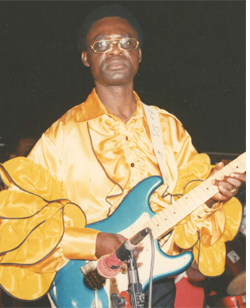|
 Lutumba, "Simaro" (Lutumba Ndomanueno Massiya, Simon), eminent Congolese composer, guitarist, and band leader; born Kinshasa, Mar. 14, 1939; died Paris, Mar. 30, 2019. Lutumba, "Simaro" (Lutumba Ndomanueno Massiya, Simon), eminent Congolese composer, guitarist, and band leader; born Kinshasa, Mar. 14, 1939; died Paris, Mar. 30, 2019.
Long-time member of Congolese rumba band O.K. Jazz and one of its best composers, Simaro rose in stature over the years to become second in command to band leader Franco. Simaro learned guitar from mentor Raymond "Ray Braynck" Kalonji in a band called Micra Jazz. He moved on for a brief turn with Gérard Madiata's Congo Jazz before joining Franco and O.K. Jazz in 1961.
Simaro played rhythm guitar (called accompaniment in Congo) to Franco's lead (solo) and began to exhibit his gift for composition almost immediately. His songs from the early sixties in the crisp, three-minutes-or-less formula of 78 RPM records, like "Mado Oboyi Simaro?" (Doesn't Madeleine like Simaro any more?), concentrated on affairs of the heart. "Ma Héle" (my Helen), written in a similar vein, followed the band's trend toward longer songs enabled by 45 and 33 1/3 RPM formats.
Simaro's most celebrated works, all featuring Sam Mangwana on lead vocal, came in a clump starting in 1973. The songs took on a philosophic hue, each story suggesting a deeper lesson. "Ebale ya Zaire" (River Zaire) told of the loss of a loved one carried away on a river boat. "Cedou" (a woman's name) described relations between men and women in the broader context of the human condition. "Mabele" (the earth) discussed the nature of life and death. Simaro and Mangwana repeated their success in 1982 with "Faute ya Commerçant" (the shopkeeper's fault), about a man who gives identical gifts to his wife and mistress. These and other Simaro-penned hits earned him the sobriquet "le poète."
In the early eighties, with the country's economy in steep decline and Franco in Europe on business for extended periods, Franco appointed Simaro vice-president of O.K. Jazz. By this time two wings of the band, one in Europe with Franco and the other in Kinshasa under Simaro's leadership, were discernable. The European wing recorded most of the band's material, a situation that sparked a brief row with Franco when Simaro recorded the hit song "Maya" (1984) on his own.
As Franco's health declined towards the end of the eighties, Simaro assumed greater responsibilities in the running of O.K. Jazz. He took over as leader upon Franco's death in 1989. O.K. Jazz, with Simaro at the helm, continued to play concerts and record until the end of 1993 when a dispute over money with Franco's heirs, the actual owners of the band, led to its demise. Simaro and the musicians stayed together throughout the nineties and into the new century, performing as Bana O.K. (the children of O.K. Jazz).
Simaro resides in the upper echelon of Congolese composers, in the rarefied company of Franco and Tabu Ley. His gift for melody and knack for taking the pulse of the people translated into songs of universal beauty. Several of his hits have risen to the status of classics of Congolese rumba. As a leader, Simaro held O.K. Jazz together following Franco's death and successfully maintained Bana O.K. in Kinshasa when most of the country's musicians were leaving for economic and political reasons.
© 2011 and 2019 Gary Stewart
SELECT DISCOGRAPHY
Merveilles du Passé (Sonodisc CD36508) sixties recordings reissued 1992; Franco et l'Ok Jazz (Sonodisc CD36511) sixties recordings reissued 1992; Franco et l'Ok Jazz (Sonodisc CD36514) seventies recordings reissued 1992; Franco, Simaro et le TP OK Jazz (Sonodisc CD36519) seventies recordings reissued 1992; Franco, Simaro et le TP OK Jazz (Sonodisc CD36520) seventies recordings reissued 1992; Franco, Vicky et L'OK Jazz (Sonodisc CD36521) sixties recordings reissued 1992; Franco et L'OK Jazz (Sonodisc CD36522) sixties recordings reissued 1992; Franco & L'OK Jazz (Sonodisc CD36529) sixties and seventies recordings reissued 1993; Franco & le T.P.O.K. Jazz (Sonodisc CD36538) seventies recordings reissued 1993; Franco, Simaro & Le T.P.O.K. Jazz (Sonodisc CDS6854) eighties recordings reissued 1994.
SELECT BIBLIOGRAPHY
M. Lonoh, Essai de commentaire sur la musique congolaise moderne (Kinshasa, 1969); G. Ewens, Congo Colossus (North Walsham, U.K., 1994); Manda Tchebwa, Terre de la chanson (Louvain-la-Neuve, Belgium, 1996); G. Stewart, Rumba on the River (London and New York, 2000).
|

